23 : Love is All You Need
“The heart is like a garden. It can grow compassion or fear, resentment or love. What seeds will you plant there?”
-Buddha
There are many songs that have been written throughout time about love. Regardless of what decade it comes from, the messages and stories that these songs tell us remain relevant. Perhaps it’s because we’ve all experienced love in our life, or maybe, just maybe, our connections are deeper than that. I’d like to think of love as a universal language, one that unites and binds us as a people, and one that we all speak and understand regardless of where we come from.
This week, we all celebrated the day of love: Valentine’s Day. Origami hearts, cutouts, drawings of hearts and chocolates were abound in the Kinder 2 classroom as the children expressed their love to their teachers, parents and friends through little gifts. I asked the kindergarteners:
I love them because they cook for me.
I love them because they play with me.
I love them because they bring me to school.
I love them because they take me to the mountain and let me play with snow.
I love them because they buy me toys.
I love them beause they celebrate Christmas with me.
I love them because they read stories for me.
I love them because they love me.
This is what love looks like in the eyes of 4-5 year-olds. They’re wonderful testaments to the kind of love that they are surrounded with, so we preserved them into a little book for their parents to read.
Have you received yours? 😍
We tried going deeper into the many facets of love and how it is expressed by creating a collaborative class artwork using recycled materials. Our provocation for the activity was:
What are the different ways that we show love?
It didn't come as a surprise to me when they were able to show love once again in such a unique circumstance.
The children were packing up their outdoor toys on Wednesday when I heard an urgent voice, “Ms. Pam, come here! Look at this!” Lying on the grass was a dead bee.
“Why did it die, Ms.Pam?”
“I’m not sure what happened to it. Maybe it stung someone.”
“But why do animals die?”
“Sadly, all living things die — animals, plants, and people. There are many possible reasons why they do.”
“That’s really sad.”
“It is, but we can always be thankful for its life.”
And thank the bee, they did. The children thanked it for giving us honey and for the beautiful flowers. A funeral ensued soon after. We buried the bee in a small patch of land, and laid out 3 stones so that we will always know where it is.
“Did you know that the world will not survive without bees?"
“What's survive, Ms. Pam?”
“It means we won't be able to live.”
“But why?”
“Because bees help us grow our food, especially our vegetables. If they're not around, we won't have a lot of food to eat.”
So the children thanked the bee for giving us food, too.
“What will happen to the bee after we buried it into the soil?”
“It will take a while but they will eventually be a part of the soil, too. They will continue to help plants grow by making the soil richer.”
(They couldn't believe what I said, so they check the burial site everyday
if the bee is still there. 😆)
It was a beautiful tribute from 5-year olds for a small creature with such a big contribution to the world. Little did they know that their curiosity on the bee's life and death would lead us exactly to what it is that we were learning for our unit of inquiry this week:
Composting.
After learning about recycling and how to segregate recyclable materials, we extended our inquiry by looking into the other forms of trash that we accumulate. We unlocked the concept of composting by watching a short video and discussing the process together.
Many children made connections with things that they've learned before:
The trash goes into the water and kills the fish.
The truck gets the trash and brings it to a place for trash.
Trash is stinky when it's been there for a long time.
There's smoke that comes from trash and covers the earth. It makes the earth really hot.
(I was surprised that one of them knows about global warming
so I asked where they learned about it. The answer? Mommy told me. 💚)
We connected our lesson on composting to what we've learned about in our food unit through the book Compost Stew: An A to Z Recipe for the Earth by Mary McKenna Siddals.
The children discovered that compost is made mostly of our food waste, and if they were to make one right now, this is what it would look like based on the food they eat:
To reflect on our practices in class, we looked at our trash cans in the classroom to check if we are using them properly.
Green - Food Waste
Violet - Cans
Red - Plastic
Blue - Glass
Yellow - Paper
We will line them up in the classroom to help us sort our trash better.
I wonder, which trash would we accumulate the most? My best guess is paper. 😬
Let's find out soon.
This week is a wonderful reminder that love need not only be celebrated in one day of the year. It can be expressed not only in giving flowers, chocolates, or beautifully wrapped presents. Love is the most powerful when it is coupled with simple actions to show how much we care.
And with this, I end this week's blog with one of the most iconic love songs of all time:
Your Kindergarten teacher,
Pam








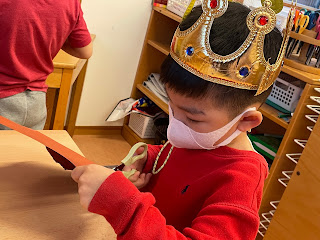



















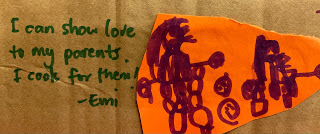





















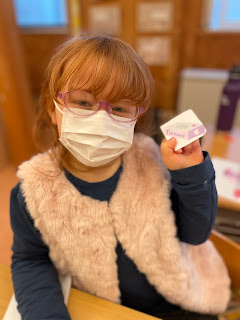
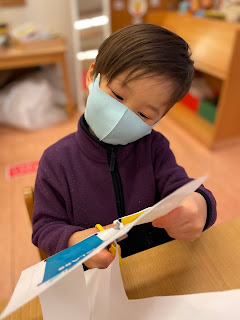


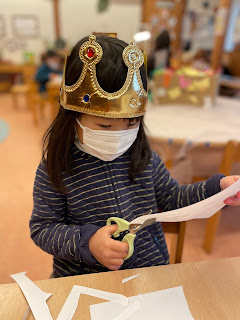

















So awesome, thank you Ms. Pam!! ❤️
ReplyDelete